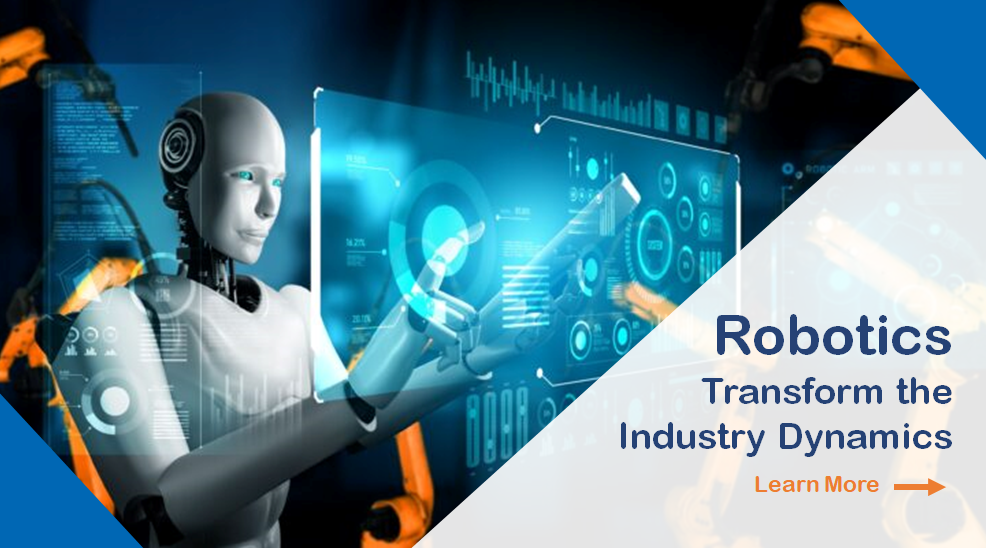Home » How Robotics Will Revolutionize in the Industry Dynamic?

In the ever-evolving landscape of industry, one factor stands out as a harbinger of change: robotics. From manufacturing to healthcare, robotics is reshaping the way businesses operate, promising increased efficiency, precision, and adaptability.
As we venture deeper into the 21st century, it’s becoming increasingly clear that robotics will play a pivotal role in defining the future of industry dynamics.
One of the most immediate impacts of robotics on industry dynamics is the automation of repetitive and mundane tasks. In manufacturing, robots are already being deployed to handle assembly lines, significantly reducing human intervention and increasing production efficiency. This automation not only accelerates processes but also minimizes errors, leading to higher-quality output. {Components of Expert System}
Robotic systems are renowned for their precision, making them invaluable in industries where accuracy is paramount. For instance, in electronics manufacturing, robots can perform intricate soldering tasks with unparalleled precision, ensuring consistent quality across products. This level of precision not only improves product quality but also reduces waste and rework, thereby optimizing resources.
Contrary to popular belief, robotics isn’t about replacing humans but rather augmenting their capabilities. Collaborative robots, or cobots, are designed to work alongside humans in shared workspaces.
These robots are equipped with advanced sensors and algorithms that enable them to perceive and respond to human presence, making them ideal for tasks that require a delicate balance of human judgment and robotic precision. This collaboration fosters a symbiotic relationship between man and machine, enhancing productivity and efficiency while ensuring safety and flexibility.
The integration of robotics into supply chain management is poised to revolutionize logistics and distribution networks. Autonomous mobile robots (AMRs) are being deployed in warehouses to automate inventory management, goods retrieval, and order fulfillment processes.
These robots navigate through dynamic environments using advanced mapping and localization technologies, optimizing warehouse layout and minimizing transit times. By streamlining supply chain operations, robotics not only reduces costs but also enhances agility and responsiveness to changing market demands. {Blockchain Reshaping Supply Chains and Transactions in Business}
Robotics is democratizing innovation by enabling businesses to develop customized solutions tailored to their specific needs. With the advent of modular robotics platforms and open-source software frameworks, companies can now design and deploy robotic systems with unprecedented flexibility and scalability.
This empowers businesses to explore new markets, iterate on existing products, and unlock new revenue streams, driving continuous innovation and differentiation in a competitive landscape.
Beyond economic implications, robotics holds the potential to address pressing societal challenges such as aging demographics and environmental sustainability. In healthcare, robots are being leveraged to assist with elderly care, rehabilitation, and medical procedures, alleviating the burden on healthcare providers and improving patient outcomes. In agriculture, robots are revolutionizing farming practices, enabling precision agriculture techniques that minimize resource usage and environmental impact.
In conclusion, the rise of robotics represents a paradigm shift in industry dynamics, ushering in a new era of automation, collaboration, and innovation. By embracing robotics, businesses can unlock unprecedented opportunities for growth, efficiency, and sustainability in an increasingly interconnected and competitive world. As we navigate this technological frontier, it’s essential to embrace the transformative power of robotics and harness it for the collective benefit of society. The future is here, and it’s robotic.
From
Tanya Chauhan
Asst. Professor in CSE Dept
Lingayas Vidyapeeth
Best Colleges in Faridabad for BCA
RECENT POSTS
CATEGORIES
TAGS
Agriculture Agriculture future AI Architecture artificial intelligence BA English BA Psychology BTech CSE BTech Engineering Business management career Career-Specific Education career guide Career Opportunities career option career scope Civil engineering commerce and management Computer Science Computer science engineering Data science degree education Engineering Engineering students English Literature english program Exam tips Fashion Design Fashion design course Higher Education Journalism journalism and mass communication law Law career Machine Learning MA Psychology Master degree mathematics MBA Mechanical Engineering Pharmacy Psychology Research and Development students
University Address: Nachauli, Jasana Road, Faridabad, Haryana
Toll Free: 1800-120-4613
Mobile : 8447744303 | 8447744304 | 8447744306 | 8447744309
Address: C-72, Second Floor, Shivalik, Near Malviya Nagar,
Above HDFC Bank, New Delhi 110017
Ph.No. - 011-46570515 / 45138169 / 41755703 / +91-7303152412
Jagmani Kutir, Ground Floor, Road No-1, Rajeev Nagar,
Near Darbar Marriage Hall, Patna-800024, Bihar
Contact No: 9818352069/8130120095
Mail: [email protected]
Copyrights © 1998 - 2025 Lingaya's Vidyapeeth (Deemed To Be University). All rights reserved.
It is important to note that the following email IDs and domains are fraudulent and do not belong to our university.
LV only conducts physical/online verification of any document related to examination on the following email id: